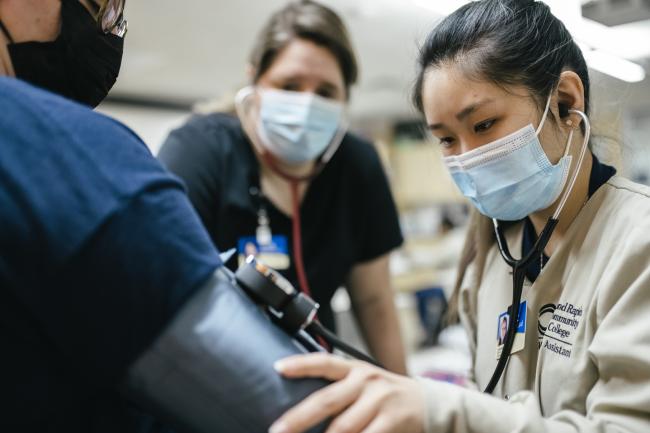Oct. 5, 2022 GRAND RAPIDS, Mich. – The U.S. Department of Health and Human Services has awarded Grand Rapids Community College and partners $2.9 million over three years to increase the number of community health workers in West Michigan.
GRCC is one of five colleges or organizations in Michigan to earn the grant, and the only community college.
Students will earn a community health worker, medical assistant, or personal care assistant certification. Registration opens in November.
GRCC is partnering with Cherry Health, Trinity Health and Spectrum Health’s Healthier Communities for the training, working together for the training and placement within the organizations.
“Our community turns to GRCC to help residents gain the skills they need for important roles, especially in the rapidly growing and changing world of healthcare,” said Julie Parks, dean and executive director of Workforce Training. “We’re proud to partner with some of the top healthcare providers in West Michigan to provide the training, fill a critical need, and help our residents.”
Community health workers help people navigate and access health services and adopt healthy behaviors. They can help people connect to needed health care, access health insurance, educate healthcare providers and other stakeholders about community health needs, collect data for use in determining programs and policies, and provide some screenings and referrals.
“Cherry Health is honored to be part of this collaborative effort allowing us and the other partnering organizations to accelerate our ability to fill gaps in care and use non-traditional methods to develop meaningful career-pathing opportunities for community health workers,” Cherry Health President and CEO Tasha Blackmon said. “Through this program, our staff and other community members will develop skills we feel are critical as we advance patient care. By streamlining training for Community Health Workers, we will make our communities healthier and empower these individuals to grow in their healthcare careers.”
GRCC will use the grant to train new community health workers and expand the skills of current ones. Those in the program will gain hands-on experience by working in the field and through apprenticeships.
“Well-trained and compassionate community health care workers are an integral part of what we do here, bringing inclusive and quality health services to communities that need it most,” said Paula Schuiteman-Bishop, vice president for Healthier Communities operations at Spectrum Health. “Programs such as Maternal/Infant Health and More Life, Mas Vida, have a significant impact on the health and wellbeing of so many individuals in the area and are the perfect means for providing quality education and training to aspiring health care professionals or those who are looking to brush up on their skills. We look forward to participating in this effort.”
The Health Resources and Services Administration awarded more than $225 million to 83 grantees nationally through the American Rescue Plan to provide and apprenticeships to about 13,000 community health workers across the nation.
"Patients depend on community and public health workers for care and medical information,” Health and Human Services Secretary Xavier Becerra said in a release. “These investments will equip community and public health workers with the skill sets needed to provide effective community outreach, increase access to care, and assist individuals with critical prevention and treatment services.”
Parks said the partners are coordinating this month on the final details of how the program will work.
“As trusted health care messengers, community health workers are essential to connecting individuals from historically underserved communities to health care and helping people stay connected to care and services,” HRSA Administrator Carole Johnson said. “Today’s awards are an important step in expanding the health workforce at a time when people need support accessing care and treatment for mental health and substance use disorders, chronic disease and COVID-19.”
